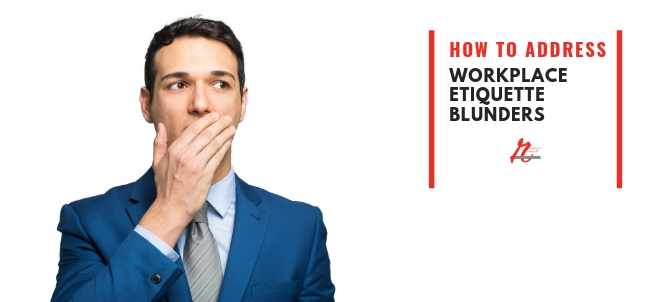No matter how diligent and professional we might be, there will be a moment when we say or do the wrong thing, with the wrong person. We may not even be aware of the infraction until we get the cold shoulder from the offended person. Whether or not the slight or workplace etiquette faux pas was intentional or not, acknowledging it and discussing it as soon as possible is the best recourse. One of the benefits of a modern workplace should be that calling out inappropriate conduct should be straightforward and taken very seriously by employers.
Unlike our personal lives where we might just shrug our shoulders about the effects of a flippant comment or a difference of opinion, a workplace slip-up needs to be dealt with. Making excuses such as “I’m uncomfortable with conflict” or “I’m afraid they will fire me.” may make you come across as unprofessional or even irresponsible.
[bctt tweet=”While dealing with a #Workplace etiquette blunder can be awkward, you shouldn’t ignore the hurtful comment, email or embarrassing bodily function. Your #ProfessionalReputation could depend it. ” username=”rosalindatweets”]
I don’t know many people who are “comfortable” with conflict. By addressing the workplace etiquette blunder, you are freed to move on. And if you’re afraid that your slip-up will get you fired, take the time to dig deeper or talk to a trusted colleague to see what the bigger issue is. Besides, it’ll only look worse if it’s discovered later. But what are you supposed to do if you find that your employer is working in an unethical way in the workplace? It can be hard to talk to a coworker about it as they may go straight to the employer themselves and this could cause unnecessary problems. There are people who you can talk to though, like whistleblower litigation attorneys who work to protect the rights and well being of a whistleblower. You report the problem and they will help to get it resolved in a professional manner. You should never worry about speaking up, but it’s probably worthwhile to read the list below to ensure that no further problems arise in the workplace.
Workplace Etiquette Blunder 1: Insulting a Coworker or Client
Once you become aware that your words or actions have left a coworker or client feeling hurt, insulted, angry or confused, address the issue before the feelings escalate, the working atmosphere is compromised, and your reputation is damaged. If you are often on the receiving end of the insults, you may want to learn how to stand up for yourself without causing malice. Here are three constructive ways to react:
- Accept the Other Person’s Reaction: You may not have intended any offense but you must accept that the offended person is offended. It doesn’t help to say things like: “You’re too sensitive” or “You need to loosen up,” even if it’s true. Hear the person out, understand their point of view and see if you can tactfully defuse the situation.
- Own Your Words: Even if you don’t agree with the other person’s reactions, take a moment to simply and calmly rephrase your comment, or explain why you decided to take a particular action. By taking responsibility for, and explaining, your words or action, you can help build understanding that-fingers crossed-will help both of you move on.
- Apologize: Don’t justify or makes excuses for a perceived slight. Make eye contact, state what you are apologizing for, and tell the other person that it won’t happen again. Give them a moment to speak. Then shake hands and move on.
Workplace Etiquette Blunder 2: Email Mishaps
Email is an essential business tool. It’s instant communication that can become an instant disaster if you inadvertently insert the wrong email address, or “reply all,” or “cc” the wrong person. If you hit “send” too quickly and immediately have the stomach-churning feeling that accompanies the knowledge you’ve delivered your message to the wrong eyes, what do you do next?
Start by addressing the situation head-on. Some people try to ignore the faux pas and hope that the unintended email recipient(s) does the same. Not a great approach. The sooner you take responsibility for what you’ve done, the better. The clarification will also help to stop the email from being further circulated and misconstrued.
If the email had something to do with company or client information, immediately alert your boss. If it included a gossipy remark about a coworker, immediately speak to the belittled coworker, preferably face-to-face, and offer an apology.
Before you hit send for any email, it’s wise to take these precautions:
- Read the Entire Email Carefully: Taking an extra 30 seconds to read the entire email could save you from looking lazy or indifferent, being repetitive, or overlooking a significant detail.
- Evaluate Your Email “To” List: Before sending an email, carefully double-check that your intended recipient or recipients are all the right ones. It takes only one wrong click to add an unintended address. And use “reply all” and “CC” sparingly. Ask yourself if what you are saying is relevant and helpful to everyone. Remove all names not pertinent to the message.
- Watch What You Say: If the email content is off the record, gossip, very personal or could be deemed inappropriate, don’t send it! Emails can be saved and forwarded later, without your consent. Unethical but it happens.
- Take a Breath Before Replying: Never reply to an email when you are angry, upset, hungry or in a hurry. There’s a reason you’ve heard this a million times. Reacting instead of responding is the difference between stirring the pot and coming to a resolution. If you’re being pressured for a response but need some time to gather your thoughts, say so. “I understand that you want an answer. I’ll respond by the end of the day.”
Workplace Etiquette Blunder 3: Bodily Functions Erupt
Have you become so comfortable around your coworkers that when you feel gas building up inside, you just let one rip? Or after a meal, you belt out a big ol’ burp? If your coworkers have not asked you to stop it, stop it! Silence doesn’t indicate approval.
Could farting or burping in the workplace cause such a stink that you end up in court? Among other issues, Cheryl Horner v. U.S. Postal Service (2007) included in her complaint that “Sexual harassment occurred as evidenced by ‘farting games’ on the intercom engaged in by the Supervisor and a male coworker…” So yes, it could.
If you claim that your excessive flatulence is due to a medical condition, such as celiac disease, it is up to you to prove it. And, as with coughing and hacking due to a respiratory ailment, it is up to your employer to find a way to work around the problem all while making all other employees feel comfortable and safe.
If you are faced with an unwanted eruption, it’s best to deal with the situation directly. For example, if you are in a meeting with a boss and colleagues and audibly pass wind, don’t try to blame the person beside you. Move away, as a considerate gesture, and simply say sorry.
Or let’s say you work often with another employee and they have gotten comfortable enough to release pent-up gas whenever they feel the need. Don’t just gag and bear it. Try saying, for example: “I haven’t said anything before, but from now on when we work together, I’d rather we keep our bodily functions private.”
We all mess up, stick our foot in our mouth, overlook something, or unknowingly offend a coworker or client. Instead of ignoring the workplace etiquette breach, take responsibility, apologize when necessary and offer a way to fix the problem. This demonstrates integrity, work ethic, maturity and good judgment-all valuable traits for establishing a professional reputation.
_____________________________________________________________
Rosalinda Oropeza Randall, Workplace Civility, Soft Skills, Business Etiquette Expert, Media Source, and author of “Don’t Burp in the Boardroom.”
Presentations are available to support HR policies and harassment compliance, address concerns, or to avert potential conflicts – Upgrade or set a standard of communication and behavior – Up-and-coming managers – Interns – New-hire orientation process – Professional development events or conferences – College/university students – Actors to prepare for roles – NEW! Attorneys: polish your client’s professional presence for a court appearance.
For more information, please contact me via email, or by calling 650.871.6200, before a dilemma turns into front-page news.









